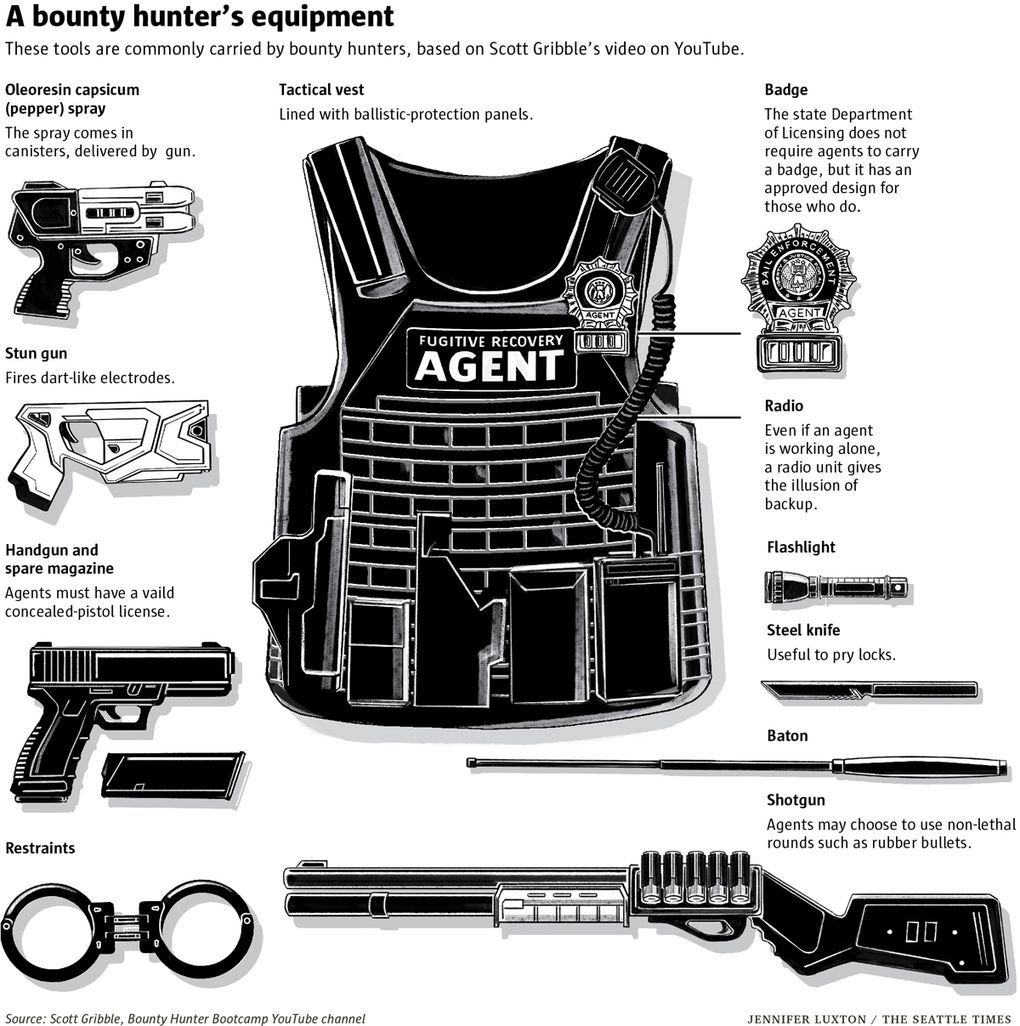
Daphne Congcong Zhang a Bounty Hunter’s license in Washington is relatively easy, and hardly anyone is turned away — even if they have a history of violence.
VIOLENCE BY BOUNTY HUNTERS IS INCREASING
According to Zhang, local bounty hunters have become increasingly violent. For example, in 2016, a bounty hunter shot and killed a fugitive’s mother in Graham, Pierce County, in a botched apprehension attempt. The bail-recovery agent in that case obtained a license despite three previous arrests for domestic violence and harassment.
That same year, three bounty hunters armed with guns and tear gas stormed a motel room in Spokane, sending other guests fleeing and illegally detaining an occupant who was not their target. One of the bounty hunters had been charged with crimes ranging from aggravated battery to resisting arrest, and had a felony conviction for grand theft that was later vacated — all before he was granted his license. He and another bounty hunter pleaded guilty to criminal mischief in the hotel case; the third was acquitted by a jury.
LICENSING REQUIREMENTS TOO LOW?
Washington state law does not prohibit people with criminal histories from becoming bounty hunters. Instead, the Department of Licensing reviews the legal histories of applicants case by case to determine whether they should be disqualified.
Unlike Washington, New York and New Jersey require applicants to have at least three and five years of law-enforcement experience, respectively. New York regulates who can train bounty hunters and approves the curriculum.
New York also considers arrests and a history of criminal charges on top of convictions in approving applications, said Robert McCrie, professor at John Jay College of Criminal Justice. “If someone has a series of arrests that shows propensity for violence, officials at the Division of Licensing Services can reject them.”
HIGHLY UNREGULATED AND VERY UNTRAINED
Zhang reports that bounty hunters have sweeping powers to apprehend fugitives, in contrast to police officers, thanks in part to the 1872 U.S. Supreme Court case Taylor vs. Taintor. They can enter homes without warrants; they can break down doors without knocking or announcing themselves; and they can transport fugitives across state lines without extradition orders.
“The bail-bonds-recovery industry has been highly unregulated and very untrained,” said Brian Johnson, a professor studying the American bail-bonds recovery industry at Grand Valley State University in Michigan. In most states, commercial bail bondsmen and the bounty hunters they hire are an integral part of the justice system.
When suspects are arrested, a judge can release them on their own recognizance or on bail to ensure they show up for court. If the defendants can’t afford bail, they can turn to private bail-bond companies, which will post it for them, typically for a fee of about 10 to 15 percent of the bond. If a defendant doesn’t show up for court, the company is on the hook for the full amount, unless it can apprehend the defendant and return him or her to court.
That’s where bounty hunters come in.
INCREASE TRAINING?
Former state Sen. Adam Kline, who sponsored a bill that passed in 2008 increasing mandatory training hours from four to 32, called the department’s background-check system concerning.
“The DOL needs to be very clear that no felony and violence-related convictions, even if they have been vacated, should be permitted,” he said. Kline said he also considers the current lack of training oversight troubling, and said the Legislature should strengthen regulations.
Please read my Legal Guide titled Making Bail and contact my office if you, a friend or family member are charged with a crime, are out on bail and failed to appear for court. Trust me, quashing a warrant is far easier than dealing with bounty hunters. Hiring an effective and competent defense attorney is the first and best step toward justice.






